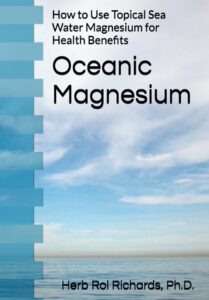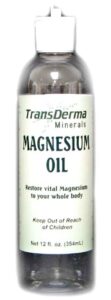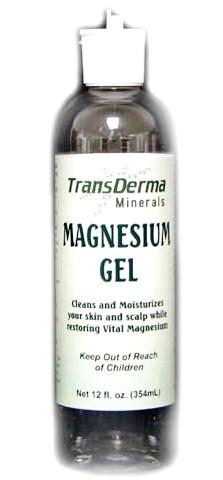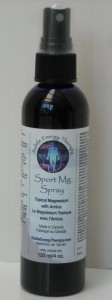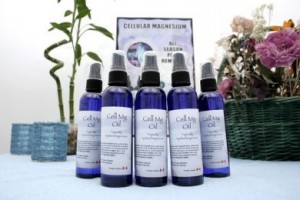Join our Mailing List for updates on Transdermal Magnesium and other Natural Products |
Tag Archives: magnesium spray
Cell Mg Sports Magnesium Spray 120 ml 4 oz
Product Information
1 – 4 oz bottle of highly concentrated magnesiun spray oil. It is called oil because it feel slick- it has no oil added. Transdermal (through the skin) magnesium (from the Dead Sea) 120 ml bottle approx 4 oz.
|
Sports Injuries & Transdermal Magnesium Therapy! Transdermal magnesium chloride mineral therapy |
|
|
| Every athlete gets injured from time to time; it’s part of the courage and discipline of athletes to endure and a challenge to their spirits to remain positive and optimistic about their return to full performance. When an athlete gets injured they want top quality care that is at the leading edge of sports medicine. |
| If you are like most athletes, you want to heal naturally from your injury and do so in record time without having to resort to drugs or surgery. There is no greater way to accomplish this than by employing transdermal medicine using magnesium chloride.
The last thing any trainer or sports doctor wants to see are their athletes injured. Dr. Jeff Schutt says that hamstring injuries can be avoided through nutritional support because contraction and relaxation is dependent on adequate cellular levels of magnesium. “A shortened hamstring is a result of lack of available magnesium,” he says. Liquid magnesium chloride can be simply sprayed and rubbed into a sore Achilles tendon to decrease swelling. And soaking the feet in a magnesium chloride footbath is the single best thing – apart from stretching – that you can do for yourself to protect from, or recover from hamstring and other injuries. Transdermal magnesium therapy offers an exciting breakthrough in sports medicine. Coaches can now treat injuries, prevent them, and increase athletic performance all at the same time. Transdermal magnesium chloride mineral therapy enhances recovery from athletic activity or injuries. It reduces pain and inflammation while propagating quicker regeneration of tissues. Topical application of magnesium chloride increases flexibility, which helps avoid injury. It also increases strength and endurance. Transdermal Magnesium Therapy is a boon for athletes, coaches and doctors who practice sports medicine. Magnesium chloride, when applied directly Transdermal magnesium therapy is ideal for pain management, diabetic neuropathy and inflammation. The combination of heat and magnesium chloride increases circulation and waste removal. The therapeutic effect of magnesium baths is to draw inflammation out of the muscles and joints. Dr. Linda Rapson, who specializes in treating chronic pain, believes that about 70 per cent of her patients who complain of muscle pain, cramps and fatigue are showing signs of magnesium deficiency. “Virtually all of them improve when I put them on magnesium therapy,” says Rapson. “It may sound too good to be true, but it’s a fact.” Having ones massage therapist use the
Sports massage is for a pre-event rubdown or as a post-event recovery to sooth the aches and pains caused by physical exertion. A restorative or rehabilitative sports massage during training helps you train harder or nurse a sports injury back to health. Imagine if magnesium oil is used instead of massage oils how much more dramatic the results will be. Massage has been used for thousands of years and in recent decades has re-emerged as an accepted method to enhance the physical, physiological and psychological well being of athletes. Magnesium sports massage helps increase flexibility, increase muscle tone and therefore reduce the risk of injury. Other benefits are breakdown of scar tissue after injury, improved blood circulation and increased oxygenation to the tissues which provides general relaxation and stress reduction and improves sports performance. Athletes recovering from injuries will find that magnesium massage speeds up their return to competition so the managers, trainers and owners of sports clubs will invest in the treatments. A magnesium massage holds great potential to assist athletes to become better, rather than merely normal. Where minor injuries and lesions occur, due to overexertion and/or overuse, magnesium massage can break them down quickly and effectively. Magnesium sports massage can help prevent those niggling injuries that so often get in the way of performance and achievement, whether a person is an elite athlete or a once a week jogger. A typical treatment of sports injuries includes massage, gentle rhythmical movements (harmonics), and stretching, articulatory and manipulative techniques. Emphasis is placed on increasing the range of movement, decreasing muscle tension, and improving circulation of the blood vessels and lymphatic system. The effect of this is to decrease swelling and pain, thereby enhancing the body’s self-healing process.
|



